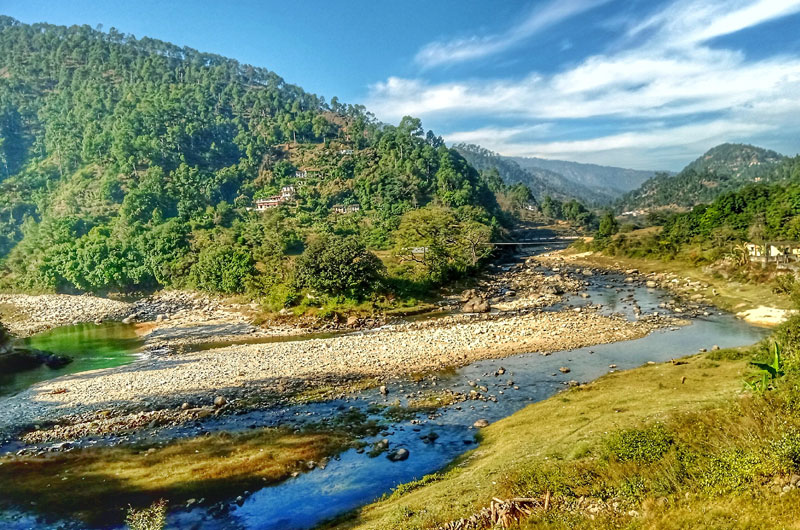
The Gomti River: A Sacred Journey Through Uttar Pradesh
The Gomti River, often revered as a sacred river in Hinduism, meanders through the northern Indian state of Uttar Pradesh. Originating from the Vindhya Range near the town of Pilibhit, the Gomti travels a distance of approximately 900 kilometers (560 miles) before merging into the Ganges River. Known for its historical significance, spiritual connections, and picturesque landscapes, the Gomti River holds a special place in the hearts of many. It serves as a vital water source, a historical landmark, and a serene retreat for tourists and pilgrims alike.
1. Geography and Flow of the Gomti River
- Source and Course:
- Origin: The Gomti River originates from the Vindhya Range near Pilibhit in Uttar Pradesh.
- Course: It flows through major cities such as Lucknow, Sultanpur, and Jaunpur before merging into the Ganges River.
- Length: Approximately 900 kilometers (560 miles).
- Locality:
- States: Primarily Uttar Pradesh.
- Major Cities Along the River: Pilibhit, Lucknow, Sultanpur, Jaunpur, and Gazipur.
- Tourism Specialty:
- Scenic riverbanks ideal for relaxing strolls and spiritual reflections.
- Historical and cultural landmarks situated along the river.
- Opportunities for boat rides and riverfront picnics.
2. Historical Significance
- Ancient and Medieval Importance:
- The Gomti River has been an important part of the region’s history since ancient times. It is mentioned in various Hindu texts and scriptures as a sacred river.
- Many historical cities and towns have developed along its banks, which have played a significant role in regional trade and culture.
- Cultural Relevance:
- The Gomti is believed to be a daughter of the sage Vasistha and has been worshipped in various forms throughout history.
- Pilgrims visit the river to take holy dips and perform rituals, adding to its spiritual significance.
- Modern Era:
- Today, the Gomti continues to be a crucial water source for the region and holds importance in local culture and religious practices.
- Tourism Specialty:
- Historical monuments and temples located along the river offer insights into its cultural and religious importance.
- Guided tours and educational walks highlighting the river’s historical journey and significance.
3. Natural Beauty and Attractions
- Scenic Spots:
- Gomti Riverfront, Lucknow: A well-maintained area offering beautiful views of the river, walking paths, and gardens.
- Gomti Barrage: An impressive structure that controls the flow of the river and offers scenic views of the surrounding landscape.
- Flora and Fauna:
- The river and its surroundings support a variety of plant species and wildlife, including migratory birds.
- The lush greenery along the riverbanks enhances the natural beauty of the area.
- Tourism Specialty:
- Boating and river cruises for a serene experience on the water.
- Photography opportunities capturing the river’s beauty and the surrounding landscapes.
4. Nearby Tourist Spots
- Lucknow:
- Tourist Attractions: Bara Imambara, Chota Imambara, Rumi Darwaza, and the Lucknow Zoo.
- Specialty: Architectural marvels, historical sites, and vibrant culture.
- Pilibhit:
- Tourist Attractions: Pilibhit Tiger Reserve, Jwala Devi Temple.
- Specialty: Wildlife sanctuary and religious sites.
- Jaunpur:
- Tourist Attractions: Atala Masjid, Shahi Bridge, and the Jaunpur Fort.
- Specialty: Ancient Islamic architecture and historical forts.
- Sultanpur:
- Tourist Attractions: Sultanpur National Park.
- Specialty: Bird watching and natural beauty.
5. Best Time to Visit
- Ideal Season:
- Winter (October to March): The weather is cool and pleasant, making it an ideal time for outdoor activities, sightseeing, and riverfront walks.
- Monsoon (June to September): The river is at its fullest and the landscape is lush and green, though heavy rains may cause flooding in some areas.
- Tourism Specialty:
- Winter months offer the best experience for riverfront activities and exploring nearby attractions.
- Monsoon season provides a unique perspective of the river’s full flow and verdant surroundings.
6. Nearby Restaurants
- Lucknow:
- Tunday Kababi: Famous for its traditional Awadhi kebabs and biryanis.
- Ritzy Restaurant: Offers a variety of North Indian and Mughlai dishes.
- Pilibhit:
- Hotel Mohan: Known for its local cuisine and traditional flavors.
- Shree Balaji Restaurant: Offers a range of North Indian dishes.
- Jaunpur:
- Hotel Kesar: Serves local and regional dishes with a focus on traditional cuisine.
- Ravi Restaurant: Known for its North Indian and vegetarian options.
- Sultanpur:
- Madhurima Restaurant: Offers a mix of North Indian and regional dishes.
- Suhani Dhaba: Known for its traditional Indian food and casual dining experience.
7. Nearby Hotels
- Lucknow:
- The Lemon Tree Hotel: A premium hotel offering modern amenities and comfortable accommodations.
- Hotel Gemini Continental: Provides luxurious stays with excellent services and facilities.
- Pilibhit:
- Hotel Pilibhit: A comfortable option with basic amenities and a central location.
- Shiv Palace: Offers decent accommodation with essential facilities.
- Jaunpur:
- Hotel Shri Ram: Known for its comfortable stay and good service.
- Hotel Surya: Offers a range of amenities and is well-rated for its hospitality.
- Sultanpur:
- Hotel Royal Castle: Provides a comfortable stay with modern amenities.
- Hotel New India: A reliable option with essential services and a convenient location.
Conclusion
The Gomti River, with its rich historical, cultural, and natural significance, offers a unique blend of experiences for travelers and pilgrims. From its serene flow and spiritual importance to the historical landmarks and scenic beauty along its banks, the Gomti River is a destination that holds a special place in the heart of Uttar Pradesh. Whether you’re seeking spiritual solace, historical insights, or natural beauty, the Gomti River and its surrounding areas provide a diverse and enriching experience.
